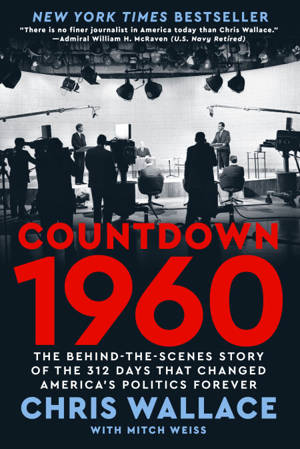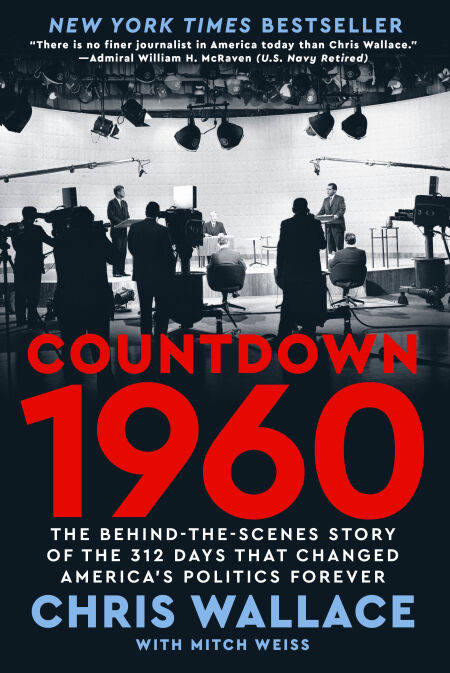
Bedankt voor het vertrouwen het afgelopen jaar! Om jou te bedanken bieden we GRATIS verzending (in België) aan op alles gedurende de hele maand januari.
- Afhalen na 1 uur in een winkel met voorraad
- In januari gratis thuislevering in België
- Ruim aanbod met 7 miljoen producten
Bedankt voor het vertrouwen het afgelopen jaar! Om jou te bedanken bieden we GRATIS verzending (in België) aan op alles gedurende de hele maand januari.
- Afhalen na 1 uur in een winkel met voorraad
- In januari gratis thuislevering in België
- Ruim aanbod met 7 miljoen producten
Zoeken
Countdown 1960 E-BOOK
The Behind-the-Scenes Story of the 312 Days that Changed America's Politics Forever
Chris Wallace, Mitch Weiss
E-book | Engels
€ 5,77
+ 5 punten
Uitvoering
Omschrijving
Instant New York Times Bestseller
The riveting new book on the momentous year, campaign, and election that shaped American history
It’s January 2, 1960: the day that Massachusetts Senator John F. Kennedy declared his candidacy; and with this opening scene, Chris Wallace offers readers a front-row seat to history. From the challenge of primary battles in a nation that had never elected a Catholic president, to the intense machinations of the national conventions—where JFK chose Lyndon Johnson as his running mate over the impassioned objections of his brother Bobby—this is a nonfiction political thriller filled with intrigue, cinematic action, and fresh reporting. Like with many popular histories, readers may be familiar with the story, but few will know the behind-the-scenes details, told here with gripping effect.
Featuring some of history’s most remarkable characters, page-turning action, and vivid details, Countdown 1960 follows a group of extraordinary politicians, civil rights leaders, Hollywood stars, labor bosses, and mobsters during a pivotal year in American history. The election of 1960 ushered in the modern era of presidential politics, with televised debates, private planes, and slick advertising. In fact, television played a massive role. More than 70 million Americans watched one or all four debates. The public turned to television to watch campaign rallies. And on the night of the election, the contest between Kennedy and Nixon was so close that Americans were glued to their televisions long after dawn to see who won.
The election of 1960 holds stunning parallels to our current political climate. There were—potentially valid—claims of voter fraud and a stolen election. There was also a presidential candidate faced with the decision of whether to contest the result or honor the peaceful transfer of power.
The riveting new book on the momentous year, campaign, and election that shaped American history
It’s January 2, 1960: the day that Massachusetts Senator John F. Kennedy declared his candidacy; and with this opening scene, Chris Wallace offers readers a front-row seat to history. From the challenge of primary battles in a nation that had never elected a Catholic president, to the intense machinations of the national conventions—where JFK chose Lyndon Johnson as his running mate over the impassioned objections of his brother Bobby—this is a nonfiction political thriller filled with intrigue, cinematic action, and fresh reporting. Like with many popular histories, readers may be familiar with the story, but few will know the behind-the-scenes details, told here with gripping effect.
Featuring some of history’s most remarkable characters, page-turning action, and vivid details, Countdown 1960 follows a group of extraordinary politicians, civil rights leaders, Hollywood stars, labor bosses, and mobsters during a pivotal year in American history. The election of 1960 ushered in the modern era of presidential politics, with televised debates, private planes, and slick advertising. In fact, television played a massive role. More than 70 million Americans watched one or all four debates. The public turned to television to watch campaign rallies. And on the night of the election, the contest between Kennedy and Nixon was so close that Americans were glued to their televisions long after dawn to see who won.
The election of 1960 holds stunning parallels to our current political climate. There were—potentially valid—claims of voter fraud and a stolen election. There was also a presidential candidate faced with the decision of whether to contest the result or honor the peaceful transfer of power.
Specificaties
Betrokkenen
- Auteur(s):
- Uitgeverij:
Inhoud
- Aantal bladzijden:
- 464
- Taal:
- Engels
Eigenschappen
- Productcode (EAN):
- 9780593852200
- Verschijningsdatum:
- 7/10/2024
- Uitvoering:
- E-book
- Beveiligd met:
- Adobe DRM
- Formaat:
- ePub

Alleen bij Standaard Boekhandel
+ 5 punten op je klantenkaart van Standaard Boekhandel
Beoordelingen
We publiceren alleen reviews die voldoen aan de voorwaarden voor reviews. Bekijk onze voorwaarden voor reviews.









